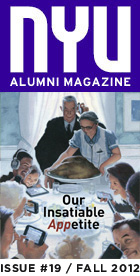 Shortly before her death in June, author and filmmaker Nora Ephron sat down with Pete Hamill,
veteran journalist and distinguished writer-in-residence at the Arthur L. Carter Journalism
Institute, to talk craft and reminisce about the New York Post. The event can be viewed
at www.nyuprimarysources.org
Shortly before her death in June, author and filmmaker Nora Ephron sat down with Pete Hamill,
veteran journalist and distinguished writer-in-residence at the Arthur L. Carter Journalism
Institute, to talk craft and reminisce about the New York Post. The event can be viewed
at www.nyuprimarysources.org
On the old New York Post city room
Nora Ephron: It was so dirty. It was sooo dirty. And it had no air-conditioning, of course. And when you came into the newsroom, there was a door with glass on it and someone had written in the dust on the door the word “filthy,” and spelled it p-h-i-l-t-h-y.… But it was romantic in its own way, that room. You didn’t even have your own desk, by the way. You had to troll for a desk.
Pete Hamill: Or a chair! They were always two chairs short.
Ephron: Yes, and all the chairs were broken. And everyone smoked and you’d put your cigarette down on the desk and it would burn into [it]. And that was part of why we all loved it. It was really fun being a reporter at the New York Post.
Hamill: To give you a sense of where it was, where Battery Park City is, it was right across the street, 75 West Street. There was no Battery Park City then; it was the United Fruit Company piers, and in the summertime the windows were all open because, as Nora says, [publisher /owner] Dorothy Schiff would never pay for air-conditioning for the working stiffs at her newspaper. So from the bowels of these fruit delivery ships would come the most gigantic mosquitoes and flies. And we’d be sitting there at our typewriters going whack [hits table] and whack [hits table]. And we were never happier. At least I wasn’t.
Ephron: I did love it, I did. I thought, “I’m gonna do this forever.”
On being a newspaper journalist
Ephron: I was clever and I could write a sentence, but I was very lucky because they kind of knew I was a new kid and I was $98 a week. My first week I had turned in a story and [editor] Fred McMorrow came over to my desk and sat down and let me watch him cross out the extra words. One of the things he told me was absolutely the opposite of what I learned in my journalism class in high school. He said, “Never start a story with a quote. We always want to know who’s saying it.” That kind of thing was so great, but it was a long time before I really knew how to write a story.
Hamill: The learning process, particularly on a tabloid like the Post, was amazingly quick because the staff was so small. There weren’t so many specialists. If there was a fire at a school, you didn’t wait for the education editor to get in a cab and go out there. You went.
Ephron: When I was there about four years, they asked me if I wanted to be a columnist, and I didn’t know how to write a column. Four years [after that], I was writing a column at Esquire. So I’m just a big believer in assembling it little by little…trying to put yourself in someplace where you can write and write and write and write…and then, eventually, you can write.







